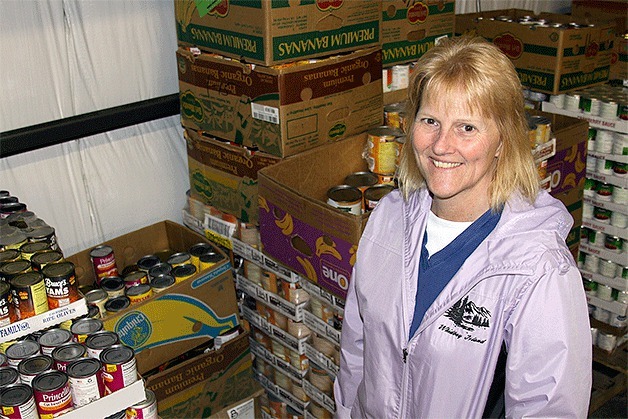It’s not that she wants to ask for help.
Circumstances in life in recent years have made it necessary to make a trip or two each week to the North Whidbey Help House to help put food on the table for herself and her son.
She is thankful not only for the produce or baked goods, but the smiles she receives when she visits.
“They are so respectful and kind and inviting,” said Amy, a disabled, single mother who asked that her last name not be used. “I think that’s why I adore them so much. They really go the extra mile to make sure no one feels ashamed or embarrassed.”
Amy is among a large number of North Whidbey people who regularly depend on the Help House.
Jean Wieman, the organization’s executive director, said the Help House will be providing holiday food baskets to help 550-600 families for Thanksgiving and again for Christmas.
She said a large number of the people her organization helps represent a fixed-income population on North Whidbey that regularly requires such assistance. And she’s happy to help them and grateful for the community that makes that possible.
“A lot of people say, ‘Is it the same people coming and getting food?’ said Wieman. “Well, yes it is. There’s always going to be a core group that’s disabled or on social security. There’s always going to be that group in a community. And we’re just happy we can fulfill that. It’s one less thing they have to worry about.”
The number of people in need has risen.
Wieman, who has worked at the Help House for nearly two decades, said that the Help House gave out 3,271 food baskets to help feed 8,061 people from January through June this year. That’s an increase of 937 baskets and 2,357 people over that same time period in 2005.
The average monthly income of clients during that same period rose $156.79, from $755.50 in 2005 to $912.28 in 2015, according to Wieman.
The generosity of the North Whidbey community through cash and food donations has allowed the Help House to continue to help those in need, Wieman said, adding the organization has never had to close its doors because of lack of supplies.
“Food is a necessity of life and fortunately, there are many people in our community who are aware of that,” Wieman said.
Continuing a tradition that dates back to the 1970s, the Help House is putting together holiday food baskets to give to families for the Thanksgiving holiday.
Those interested in helping can give cash donations, donate food items or bring in an entire food basket, including a turkey, for the Help House to distribute.
Another way to help is to “adopt” a family. Under that scenario, the Help House provides a name of a family for a donor to purchase food and deliver it to them.
The goal is to receive food donations by Nov. 19; however, donations will continue to be accepted the week of Thanksgiving.
The Help House is located at 1091 S.E. Hathaway Street in Oak Harbor. The phone number is 360-675-0681.
The Help House is open Monday, Wednesday, Thursday and Friday from 8 a.m. to 4 p.m. and Tuesday from 8 a.m. to 5 p.m.
The holiday food baskets for Thanksgiving and Christmas are mostly a product of cash donations, Wieman said, adding that they cost about $18,000 to $22,000 annually.
While many canned or other dry goods are donated, much of the rest that includes perishable items such as turkeys and produce are purchased, Wieman said.
However, fresh produce and turkeys also may be donated, though fresh turkeys should be brought by the week of Thanksgiving, Wieman said.
For those who’d like to help with food donations, Wieman suggested larger turkeys in the 20-pound range that can feed an entire family and “little extra things” such as canned olives, gravy mixes, hot chocolate and puddings to make the holiday baskets even more special.
Pallets of canned goods are starting to stack up in an outbuilding but there’s still plenty of room for donations.
“The community is wonderful and very generous,” Wieman said. “I think a lot of people assume that it just miraculously appears in the warehouse.”
Amy started volunteering at the Help House because she wanted to give back and she was touched by the people there.
Wieman is one of four paid staff, which includes two part-timers, and there are about 10 regular volunteers.
The cost of running the nonprofit is about 12 percent of the overall budget, Wieman said.
“It’s so important for people like me who go there regularly now,” Amy said. “There’s a community among us that go. It really helps the people who feel like they don’t belong in mainstream society. It really provides a place for us to feel we belong and that we’re important.”
She said one lady told her she likes to go to the Help House because of the sense that people care about her.
“It’s more than just food,” Amy said. “It really is.”



